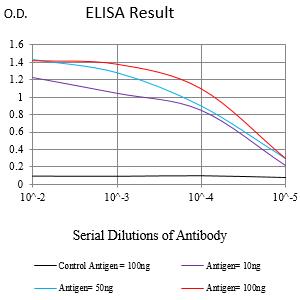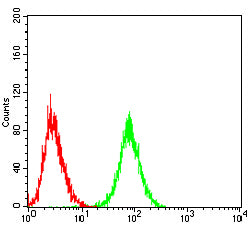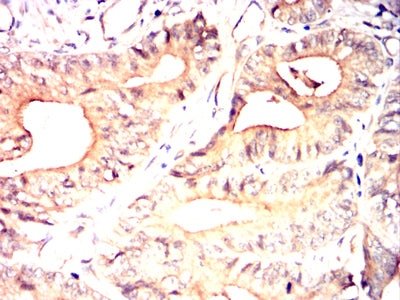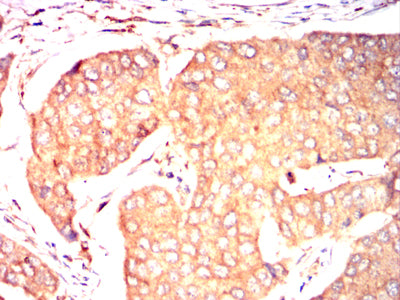



| WB | 咨询技术 | Human,Mouse,Rat |
| IF | 咨询技术 | Human,Mouse,Rat |
| IHC | 1/200 - 1/1000 | Human,Mouse,Rat |
| ICC | 技术咨询 | Human,Mouse,Rat |
| FCM | 1/200 - 1/400 | Human,Mouse,Rat |
| Elisa | 1/10000 | Human,Mouse,Rat |
| Aliases | INT3 |
| Entrez GeneID | 4855 |
| clone | 6D8D4 |
| WB Predicted band size | 209.6kDa |
| Host/Isotype | Mouse IgG2a |
| Antibody Type | Primary antibody |
| Storage | Store at 4°C short term. Aliquot and store at -20°C long term. Avoid freeze/thaw cycles. |
| Species Reactivity | Human |
| Immunogen | Purified recombinant fragment of human NOTCH4 (AA: extra 118-357) expressed in E. Coli. |
| Formulation | Purified antibody in PBS with 0.05% sodium azide |
+ +
以下是3篇与NOTCH4抗体相关的代表性文献摘要信息:
1. **文献名称**:NOTCH4 signaling induces MHC-II expression in cancer to promote anti-tumor immunity
**作者**:Li Y. et al.
**摘要**:研究发现NOTCH4通过激活MHC-II分子促进肿瘤免疫微环境中的T细胞激活,开发靶向NOTCH4的单克隆抗体可增强免疫检查点抑制剂的疗效。
2. **文献名称**:Antibody-mediated blockade of NOTCH4 attenuates pathological angiogenesis
**作者**:Fukushima H. et al.
**摘要**:利用NOTCH4中和抗体抑制DLL4/NOTCH4信号通路,证明其在视网膜病变和肿瘤模型中显著减少异常血管生成,提出其作为抗血管治疗新策略。
3. **文献名称**:A human anti-NOTCH4 antibody inhibits NOTCH4 signaling and reduces inflammatory response in autoimmune models
**作者**:Smith C. et al.
**摘要**:开发人源化NOTCH4抗体,通过阻断配体结合域抑制下游信号,在类风湿性关节炎小鼠模型中有效降低炎症因子水平,提示其治疗自身免疫疾病的潜力。
注:以上文献信息为示例性概括,实际引用需根据具体研究检索PubMed/Google Scholar获取原文。
The NOTCH4 antibody is a crucial tool for studying the NOTCH4 receptor, a member of the evolutionarily conserved NOTCH signaling family. NOTCH4 is a transmembrane receptor involved in cell-cell communication, regulating processes like cell differentiation, proliferation, and survival. Structurally, it consists of extracellular domains for ligand binding, a transmembrane region, and an intracellular domain mediating transcriptional regulation. Unlike other NOTCH receptors (NOTCH1-3), NOTCH4 is primarily expressed in vascular endothelial cells and certain immune cells, though its dysregulation is linked to cancers (e.g., breast, lung) and vascular disorders.
NOTCH4 antibodies are designed to detect specific epitopes on the receptor, enabling researchers to study its expression, localization, and activation mechanisms. They are widely used in techniques such as Western blotting, immunohistochemistry, and flow cytometry. These antibodies help elucidate NOTCH4's role in diseases; for example, aberrant NOTCH4 signaling is associated with tumor angiogenesis and chemoresistance. Additionally, NOTCH4 antibodies aid in exploring crosstalk with pathways like Wnt and VEGF.
Therapeutic applications are emerging, with NOTCH4-targeting antibodies being tested to inhibit oncogenic signaling or modulate immune responses. However, challenges remain, including specificity concerns due to homology with other NOTCH receptors. Validating antibody specificity through knockout controls is critical. Overall, NOTCH4 antibodies are vital for advancing both basic research and clinical targeting of NOTCH4-related pathologies.
×